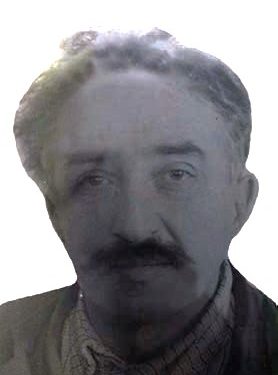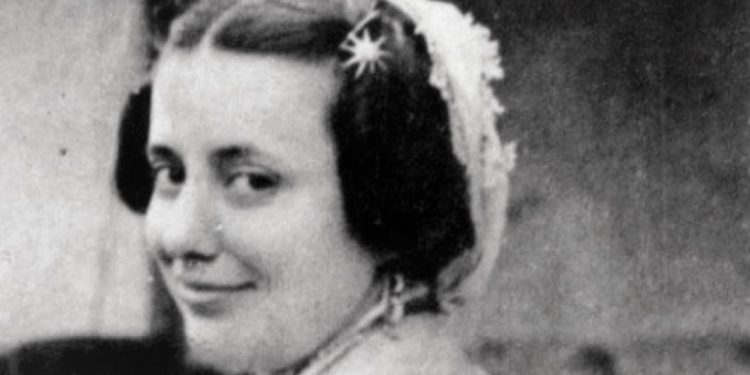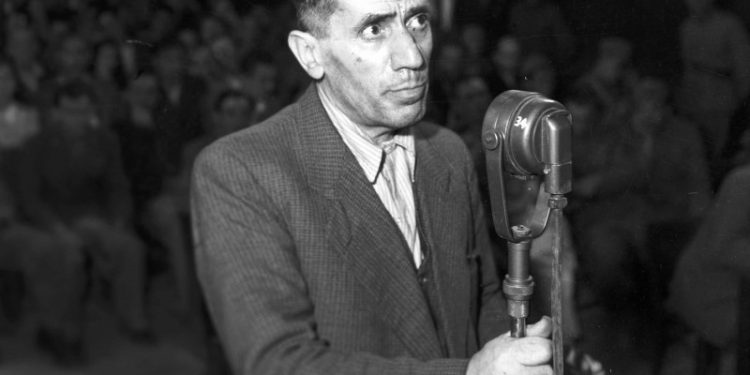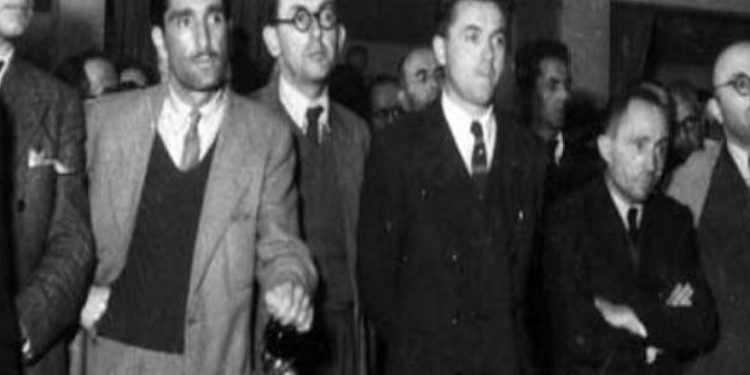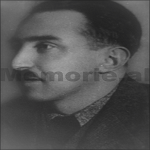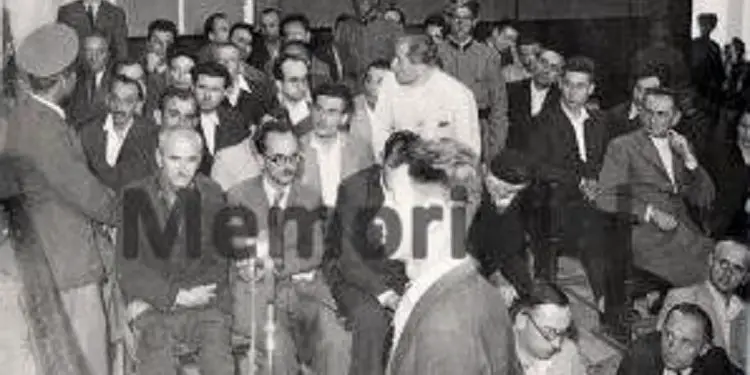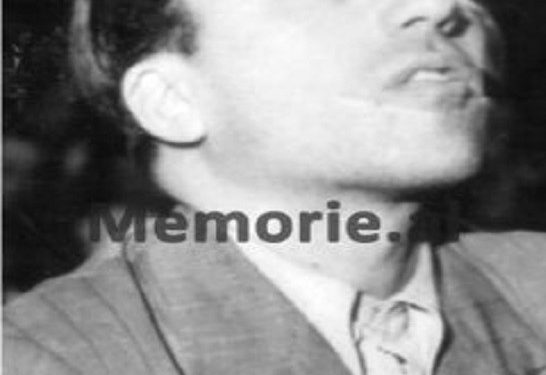Dr. Enriketa Pandelejmoni (Papa)
The second part
-Gjergj Kokoshi and his political contribution, in an atypical political atmosphere in post-war Albania-
Memorie.al / In this paper, the figure of Gjergj Kokoshi will be treated, in the context of his political contribution, in the first year after the Second World War, based on mainly archival sources, from the Central State Archive and from Archive of the Authority for Information on Former State Insurance Documents. The aim is to carry out a study, based on archival sources and discourse analysis, to shed light on one of the most interesting and least understood figures in the first year of the consolidation of power by the Communist Party, such as Gjergj Kokoshi.
The pressure seems so great that in the secret meetings the difficulty in securing enough signatures to announce the candidacies or the political group came to the fore. It was possible to collect 25-30 firms, which were insufficient to run as a political entity.
In the first meeting that took place in the house of Shaban Balla, where representatives of the three groups participated, on November 17, 1945, the group decided to come up with a concrete name, “Democratic Union”, as a union of political currents, with the aim of forming an opposition.
Kokosh’s anti-fascist and left-wing political stance is also seen when he proposes that in order to realize this, it was necessary to draw up a program and a prayer, which would be signed by several “honest people with a correct political attitude” that would be sent to the Ministry of the Interior, to inform it.
The program of this party, to the surprise of everyone gathered at the meeting, would be more or less similar to that of the Front, since this political group would also be in the direction of the Anti-Fascist Bloc. This party, according to Kokoshi’s conviction, would carry out “the same economic reforms that the Front would do, but to a lesser extent”.
It seems that in his leftist convictions, Kokoshi, as an anti-fascist, but also as a patriot, was divided with the Front, in the matter of foreign policy. He was against the policy of the Albanian government, which according to him; “I want to unite Albania with Yugoslavia”. For him, this union was against the will of the Albanian people, since; “The Albanian people want Albania to remain an independent and sovereign state, we must preserve such a state, but without Gjirokastër and without Korça, there is no Albanian state. Therefore, Albania must be protected from the North and the South”.
As for the issue of Kosovo, Kokoshi seems to have a different opinion from those present at the meeting, when he suggests that for the moment, this issue should be left aside, “since Yugoslavia helps us to preserve the territorial integrity”. Therefore, Kokoshi proposed that before the program was drawn up, the firms that were necessary to stand as an opposition in the elections should be gathered and everyone should think of the persons for the firm.
Gjergj Kokoshi, in addition to the efforts to come up with a separate party in the elections, also had faith in the British and American missions in Albania, as well as in their influence on the Albanian government, to put pressure on the way the elections were conducted especially for their postponement.
With naivety and to the surprise of the participants in the meeting, he informed them that the program and the prayer should be sent to the Albanian government, specifically the Ministry of the Interior, after he had talked with the British general Hodgson and he had suggested that for this, he should addressed to the Ministry of the Interior, of the Albanian government.
This proposal of his was met with skepticism by most of the participants in the meeting, since if they informed the government about the creation of this party, they risked being arrested. But Kokoshi insisted in his opinion, on informing the government about the political organization and the arrest should also be taken into account when they take the initiative to create an opposition party.
For this reason, they gathered in another meeting in which, in addition to the signatures, the issue of Kosovo, the program, as well as the note or memorandum that they would send to the British and American missions, were to be discussed, with the hope of influenced in postponing the elections and Gjergj Kokoshi and lawyer Fuad Asllani were put in charge; each of the founding members of the group would undertake to secure the necessary signatures, to be legalized as an electoral group.
The difficulty of collecting the signatures puzzled the organizers, to consider the real possibility of the “Democratic Union” of the three groups (“Resistance Group”, “Monarchists”, “Social-Democrats”), to participate in the elections of December 2, 1945. Therefore, their representatives met with representatives of the British mission, to present the program and a 10-point memorandum, among which the mediation of the British mission with the Albanian government was requested, to postpone the elections.
As a point of contact with the British, members of the “Democratic Union” served as translators for the British and Americans, such as; Kiço Xhonga, Avdulla Muça, Shaban Balla, Niko Beço, Hivzi Golja and “Larry Posti” (Lazar Papapostoli).
Gjergj Kokoshi himself, along with lawyer Sami Qeribashin, the main ideator of the “Democratic Union”, and Shaban Balla, notified the Western Allies, through Colonel Palmer, whom they had met several times, to discuss the steps taken. The idea that was presented to Palmer was that of forming an opposition group, in which representatives of several political trends would join, with a program and branches in several major cities of Albania, where they had supporters, such as; in Shkodër, Korçë, Tirana, Vlorë.
The “Democratic Union” would appear on its own in the elections of December 2, 1945, with its own program. Kokoshi informed the English that if the elections were free, the opposition would win 20-30%, so they needed English support. From the mission, they were communicated to draw up the program and the request for postponing the elections, after securing the signatures.
On November 20, 1945, various representatives of political groups gathered again at the house of Shaban Balla, where in this meeting Gjergj Kokoshi, as a representative of the National Liberation Front, pointed out the need to unite the groups to cooperate and form an opposition. There were also debates on whether or not the issue of Kosovo should be included in the program, where Kokoshi was initially against it, because “they should keep it good with Marshal Tito”, but he withdrew later, due to the imposition of other participants that, if Kosovo was not included in the program, they would have no difference from the Communist Party.
Likewise, Kokoshi proposed to the members of the meeting that the opposition’s program should be taken to the British, specifically to General Hudson, but also to the Albanian government. For the latter, others were against, anticipating the high risk for them, if the Albanian government was informed. In conclusion, it was left only that the program and a note on the postponement of the December elections, the democratic form of the regime, after the elections and the possibility of the return of King Zog to Albania, if after the elections it was decided on a monarchical form of the regime, were it was sent only to allied missions in Tirana.
Thus, a memorandum was drawn up in another meeting, for postponing the elections, which was sent to the English and American missions in Tirana. According to the testimony of Qenan Dibra, present at the meeting, it was agreed on the union of the three groups and the drafting of a program, a memorandum, where the aim of the “Democratic Union” was to:
- It was not possible for the elections to take place freely in today’s conditions, because the people had to vote for the (National Liberation) Front, out of fear.
- The promises given by the government did not correspond to the truth, because at that time the government had set a short deadline for the presentation of any opposition or specific candidates.
- The arrival of foreign correspondents to observe the elections is not enough.
- Observation of the elections could only be done by sending Anglo-American observers.
- An intervention on the part of the Allies was required, on the basis of the principle often proclaimed by the men of the Allied States.
To the English mission, the opposition group also sent a note, in which they requested the postponement of the elections and the sending of some observers for the elections.
Likewise, the coalition of three parties with different democratic tendencies also sought to ensure the independence and territorial integrity of ethnic Albania (Kosovo and Çamëri); the implementation of the Agrarian Reform; the punishment of War Criminals; friendly relations with neighbors; the solution of the Kosovo issue, based on the Atlantic Charter; the declaration of the neutrality of the Albanian state and the guarantee of this neutrality by the Great Powers.
But, when they handed over to the two English soldiers, Palmer and Arnott, in their mission in Tirana, they received an answer that; these had already been submitted too late and there was little hope for the postponement of the elections, but, in any case, they would be handed over to General Hodgson. In fact, the British had throughout 1945, before the Albanian government was recognized, several meetings with various representatives of the opposition, contacts which were developed by Colonel Palmer and Major Arnott.
Palmer and Arnott themselves, in the letters they sent to the British Foreign Office, in the case of accusations against the British in the group trial, for help, have clarified their position, denying that they have done to the people of opposition, concrete promises. Palmer admits that he was given a program and a memorandum, whose primary goal was to take power in a democratic and peaceful way, meaning free elections.
In the absence of these choices, force could then be used. While the memorandum required that, among other things, if a large number of them were to be arrested, then the British should support them. While Major Arnott, he also accepts frequent meetings with representatives of opposition groups in the mission. To him, their plans had seemed weak and often of a violent nature.
Even for him, these groups were ineffective and opposed each other in many basic issues, not having unity with each other. He admits that among the names he had contact with were; Gjergj Kokoshi, Sami Qeribashi, Qenan Dibra, Xhavid Koka, Fuad Asllani, Shaban Balla, Musine Kokalari, Larry Post (Lazar Papapostoli), who had seemed divided and did not inspire him, that they would be able to maintain the confidentiality of the conversations with him.
However, as mentioned above, everyone agreed on the merger of the groups, in an opposition party outside the Front, with Gjergj Kokoshin as its leader, who was a professor, who knew the youth well in schools and gymnasiums and would be able to organize it.
Musine Kokalari seems to have been skeptical about joining this coalition and also had doubts as to why Gjergj Kokoshi should be at the head of the opposition. In a conversation with Suad Aslan, she asks why Kokoshi should be in charge and why he was so necessary.
He replied that; Kokoshi was the most suitable person, as he had been at the Front, had fought, had been a minister, a deputy and was a personality known to the allies. Then she withdrew and agreed that the “Democratic Union” should be chaired by Gjergj Kokoshi, and she was the one who, in the third meeting, at Ali Kavaja’s house, wrote the memorandum for postponing the elections, together with Qenan Dibra.
The memorandum read as follows:
During the Italian and German occupation of Albania, the communists fought against the occupying forces, under the voice of the “National Liberation Front”, whose political program was based entirely on a democratic system. Such a genius call gave them the opportunity to significantly expand their ranks, enrolling a large part of the boys, who joyfully fought for the liberation of the motherland.
The reason that a large part of the youth joined the communists lies in the fact that the other two nationalist groups (Balli Kombëtar and the followers of Zogu), fearing communism and being under the influence of a part of the Allied press, did not continue the fight against the invading forces. The boys and other nationalists who participated in the National Liberation Movement never thought that they were falling into a trap and thinking about the establishment of a communist regime in Albania by force.
In this way, the National Liberation Front became the only political group, authorized under communist directives and control. The nationalists, who constituted the majority, were not allowed to form a party separate from the communists; they are also not allowed to break away from the Front, creating a party outside of it. In both cases, they are accused as saboteurs, fascists and reactionaries “the case of prof. Gjergj Kokoshi, formerly Minister of Education in Enver Hoxha’s government, clearly shows this”.
Overview of the current situation
(a). The leadership of the Anti-Fascist National-Liberation Council, the government, the councils of prefectures and sub-prefectures, as well as smaller localities, are all under communist direction and control.
(b). The three powers, that is, the legislative, executive and judicial powers, the separation of which guarantees a regime of political freedom, are actually a mixture. The multiplication of offices is done for this purpose. An example is that the head of the police, at the same time, is also a member of the judicial body (vice president), member of the General Staff, head of the Supreme Court, head of the Political Commissars in the Army, etc.
(c). All four freedoms (freedom of speech, religion, need and fear) have been trampled underfoot.
(d). All the legislation is taken from that of Yugoslavia; the most important laws are a faithful translation of Yugoslav laws.
(e). In all problems, our press and radio, present entirely Russian views.
(f). Police work is done by the Directorate of People’s Protection, whose program and activity constitute a second GPU. Its chairman, General Koçi Xoxe, is one of the two general secretaries of the Albanian Communist Party, the other being Enver Hoxha himself.
(g). The number of those who were brutally killed during the first days of the regime (150, without being tried at all in Tirana and the districts), as well as those who were tried, sentenced to death and then executed, exceeds 1,000 in the whole the country. If you take as an example France, whose population is 45 times larger than ours, which at the same time counts 2,321 death sentences, then you could understand the tragedy of the Albanian people. Many of these have been executed because if they were alive they would threaten the unity of the current regime. Memorie.al
The next issue follows




